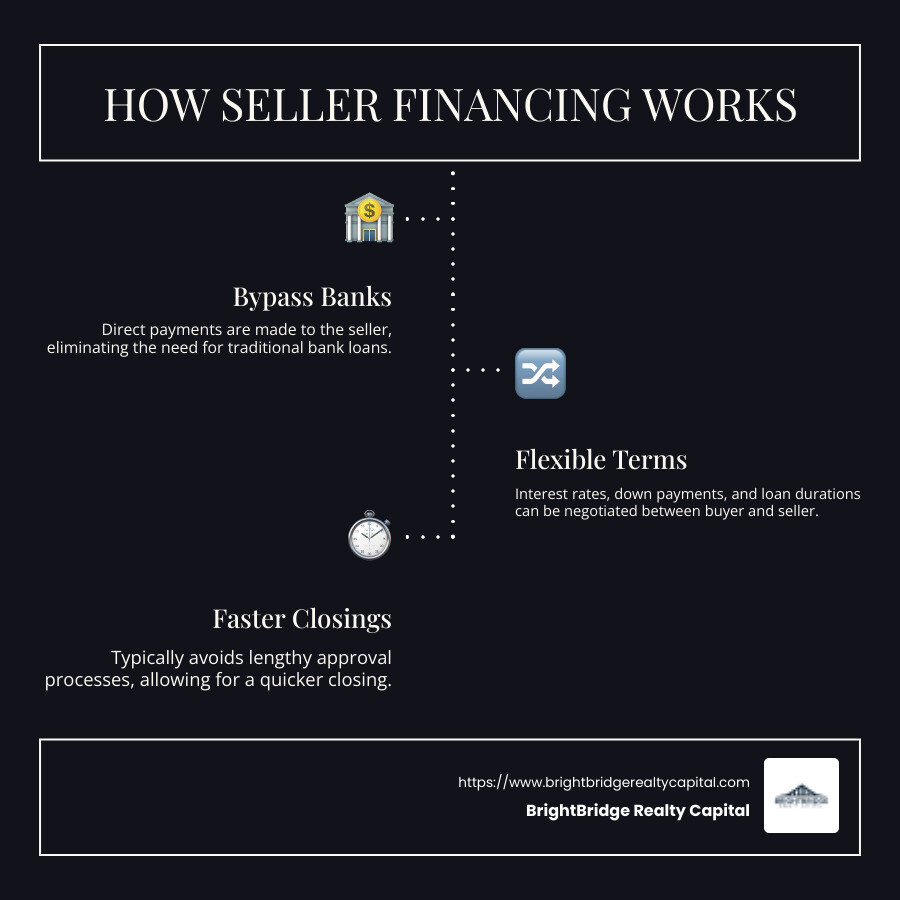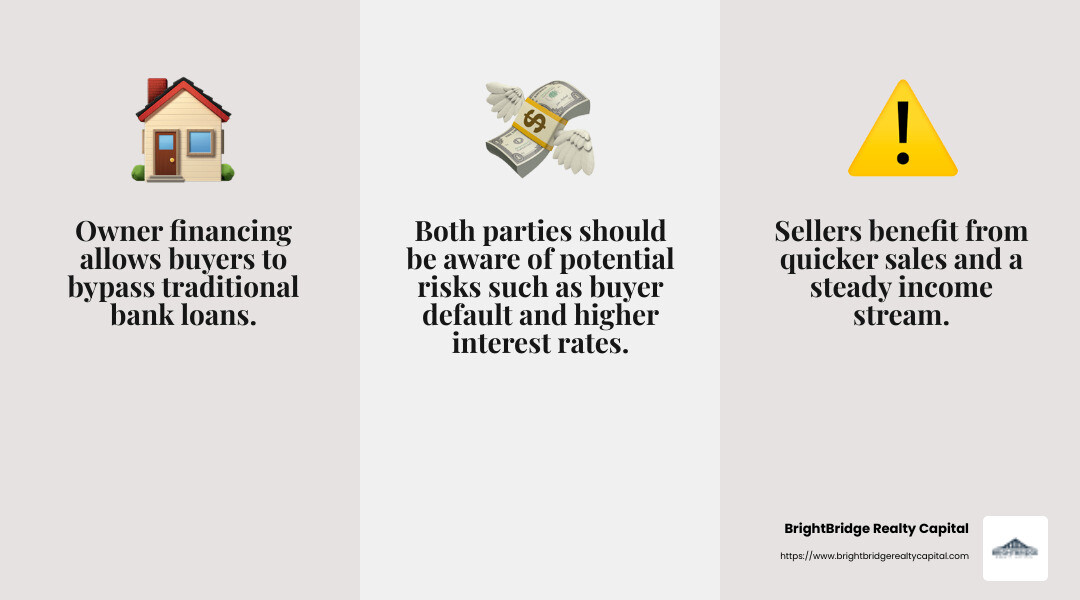Unlocking Opportunities: The Ins and Outs of Owner Financing

Real estate owner financing, also known as seller financing, is an innovative financial arrangement where the seller of a property acts as the lender. This unique approach offers flexibility and speed, eliminating the need for traditional bank loans. It allows buyers to pay the seller directly over time, often helping those who might find it challenging to secure conventional financing.
- Direct Payment to Seller: Bypasses banks, with payments made straight to the seller.
- Flexible Terms: Enables negotiation around interest rates, down payments, and loan duration.
- Faster Closings: Avoids lengthy approval processes typical with bank loans.
In today’s competitive real estate market, owner financing opens doors for both investors and homebuyers who seek quick and adaptable solutions.

Easy Real estate owner financing word list:
Understanding Real Estate Owner Financing
Real estate owner financing is a creative financing method that empowers sellers to act as lenders, offering a unique alternative to traditional bank loans. This setup is particularly beneficial in situations where buyers may struggle to qualify for conventional financing.
Creative Financing
Owner financing, often called "creative financing," provides a custom approach to property transactions. It allows sellers to customize the loan terms to fit the needs of both parties. This means that buyers and sellers can negotiate aspects such as interest rates, down payments, and repayment schedules, making the process more adaptable than traditional financing methods.
Seller as Lender
In owner financing, the seller steps into the role of a lender. Instead of the buyer obtaining a mortgage from a bank, the seller provides the funds for the purchase. This can be particularly advantageous in a buyer's market, where sellers are eager to close deals quickly. Sellers can attract a broader pool of potential buyers, including those who may not qualify for a standard mortgage due to credit issues or other financial constraints.
Promissory Note
A key component of owner financing is the promissory note. This legal document outlines the terms of the loan, including the interest rate, repayment schedule, and loan duration. It serves as the buyer's formal promise to repay the loan according to the agreed-upon conditions. The promissory note ensures that both parties have a clear understanding of their obligations and helps protect their interests.
Real estate owner financing creates a win-win situation for both buyers and sellers. Buyers gain access to properties they might not otherwise afford, while sellers enjoy a steady income stream and potentially higher sales prices. However, it's crucial for both parties to understand the terms and risks involved to ensure a smooth and successful transaction.
Advantages and Disadvantages of Owner Financing
Real estate owner financing offers a unique blend of flexibility and challenges for both buyers and sellers. Let's break down the pros and cons.
Flexibility
One of the standout benefits of owner financing is its flexibility. Unlike traditional bank loans, owner financing allows sellers and buyers to negotiate terms that suit their specific needs. This can include customizing interest rates, down payments, and repayment schedules. Such flexibility can lead to more manageable monthly payments for buyers and a quicker sale for sellers.
For example, a buyer with a less-than-perfect credit score might struggle to secure a traditional mortgage. However, with owner financing, the seller can use more lenient criteria, making it easier for the buyer to qualify. This opens up opportunities for those who might otherwise be locked out of the housing market.
Higher Interest Rates
While flexibility is a significant advantage, buyers should be aware of the potential for higher interest rates with owner financing. Sellers often charge more than conventional lenders to compensate for the increased risk they take on.
This means that while a buyer might find it easier to qualify, they could end up paying more over the life of the loan. It's crucial for buyers to weigh the benefits of easier qualification against the cost of higher interest rates.
Balloon Payments
Another important consideration is the possibility of balloon payments. These are large, one-time payments that are due at the end of the loan term. Balloon payments can be daunting, especially if the buyer hasn't planned adequately or if refinancing options are limited.
For instance, a buyer might enjoy lower monthly payments for several years, only to face a substantial final payment. If they cannot refinance or sell the property, they risk defaulting on the loan.
In summary, real estate owner financing provides a flexible alternative to traditional mortgages, offering custom solutions for both buyers and sellers. However, the potential for higher interest rates and the challenge of balloon payments require careful consideration. Both parties must clearly understand the terms to steer the complexities of owner financing successfully.
Types of Owner Financing Arrangements
When it comes to real estate owner financing, there are several key arrangements to consider. Each offers unique benefits and challenges, so it's crucial to understand how they work.
Land Contracts
A land contract, also known as a contract for deed, is a popular owner financing method. In this setup, the seller retains the property's legal title until the buyer pays off the agreed purchase price in full. The buyer, meanwhile, gains equitable title, which allows them to use and occupy the property.
This arrangement can be particularly advantageous for buyers looking to avoid the hefty closing costs associated with traditional mortgages. However, the seller holds significant leverage, as repossession is generally simpler than foreclosure if the buyer defaults.
Lease-Purchase Agreements
In a lease-purchase agreement, also known as rent-to-own, the buyer rents the property with the option to purchase it later at a predetermined price. A portion of the monthly rent payments is typically applied toward the future purchase price.
This approach is ideal for buyers who need time to improve their credit score or save for a down payment. However, it requires an upfront deposit, which the buyer may lose if they choose not to purchase the property later. This makes understanding the terms critical to avoid potential pitfalls.
Mortgage and Deed of Trust
A mortgage and deed of trust arrangement is similar to a traditional mortgage but involves the seller acting as the lender. The buyer signs a promissory note agreeing to repay the loan amount, and the property serves as collateral.
This setup is often more flexible than bank loans, allowing for customized terms. However, buyers should be mindful of potential balloon payments and higher interest rates, which can make this option more expensive over time.
In conclusion, real estate owner financing offers diverse arrangements like land contracts, lease-purchase agreements, and mortgage and deed of trust. Each provides unique paths to homeownership, catering to different buyer needs and seller preferences. Understanding these options helps in making informed decisions, ensuring a smoother transaction for all parties involved.

Real Estate Owner Financing: A Buyer’s Perspective
When diving into real estate owner financing, buyers often find themselves in a more flexible and accessible environment compared to traditional bank loans. Here's why:
Easier Qualification
One of the most appealing aspects of owner financing is the relaxed qualification process. Traditional lenders often turn away buyers with less-than-stellar credit scores. But with owner financing, sellers can set their own criteria. This flexibility opens doors for many who might otherwise be shut out of the housing market.
Negotiable Terms
Another significant advantage is the ability to negotiate terms directly with the seller. This can include everything from interest rates to payment schedules. Imagine being able to discuss and agree on a monthly payment that suits your budget, rather than being locked into a bank's rigid terms. This flexibility can lead to more manageable payments and a more comfortable home-buying experience.
Potential Risks
However, it's not all smooth sailing. Buyers need to be aware of potential risks. Higher interest rates are common in owner financing deals, which can make the total cost of the home more expensive over time. Additionally, some agreements may include a balloon payment—a large sum due at the end of the loan term. This can be a significant financial burden if you're not prepared.
Moreover, the lack of a traditional lender means there's less oversight. This puts the onus on the buyer to thoroughly understand the terms and ensure they are fair. Consulting with a real estate attorney or financial advisor can be a wise move to avoid pitfalls.
In summary, real estate owner financing offers a path to homeownership with easier qualifications and negotiable terms. Yet, buyers must steer potential risks, such as higher interest rates and balloon payments, with caution.
Real Estate Owner Financing: A Seller’s Perspective
From a seller's standpoint, real estate owner financing can be a strategic move with numerous benefits. However, it also comes with its own set of challenges. Let's explore what this means for sellers.
Quicker Sales
One of the primary advantages for sellers is the potential for quicker sales. By offering owner financing, sellers can attract a broader pool of buyers, including those who may not qualify for a traditional mortgage. This flexibility can lead to faster transactions, as the process bypasses the lengthy bank approval procedures. In competitive markets, this speed can be a significant advantage, allowing sellers to offload properties swiftly.
Steady Income Stream
Owner financing also provides sellers with a steady income stream. Instead of receiving a lump sum payment, sellers collect monthly payments that include both principal and interest. This can be particularly appealing for those seeking a reliable source of income over time. It's like having a recurring paycheck, which can be especially beneficial for retirees or those looking to diversify their income sources.
Buyer Default Risk
However, this financing method isn't without risks. One of the most significant concerns is the risk of buyer default. If a buyer fails to make the agreed-upon payments, the seller may have to initiate a foreclosure process to reclaim the property. This can be time-consuming and costly. Additionally, the property's condition might have deteriorated during the buyer's tenure, potentially reducing its market value.
To mitigate these risks, it's crucial for sellers to create a well-structured agreement. This includes clear terms for default and the steps to be taken in such an event. Consulting with legal professionals to draft these agreements can provide an added layer of protection.
Real estate owner financing offers sellers the opportunity for quicker sales and a steady income stream. However, it's important to weigh these benefits against the potential risks, particularly the possibility of buyer default. By preparing thoroughly and seeking expert advice, sellers can steer these waters with greater confidence.
Legal Considerations in Owner Financing
When delving into real estate owner financing, understanding the legal aspects is crucial. This ensures a smooth transaction and protects both buyers and sellers. Let's break down the key components you need to know.
Promissory Note
At the heart of any owner financing deal is the promissory note. This is a legal document that outlines the terms of the loan. It includes the interest rate, repayment schedule, and what happens if the buyer defaults. Think of it as the buyer's promise to pay back the loan under specific conditions. A clear and detailed promissory note helps prevent misunderstandings and provides a solid foundation for the financing agreement.
Security Instruments
Security instruments like mortgages or deeds of trust are essential in protecting the seller's interest. They give the seller the right to reclaim the property if the buyer defaults on the loan. This legal backing is crucial, as it ensures the seller can recover their investment if things go south. The choice between a mortgage or a deed of trust can depend on state laws and personal preferences, but both serve the same fundamental purpose: securing the seller's financial interest.
State Regulations
State-specific regulations can significantly impact owner financing agreements. For example, some states have strict usury laws that cap the interest rates sellers can charge. Others might have specific disclosure requirements, ensuring buyers fully understand the property's condition and the financing terms.
Moreover, the process for reclaiming a property after a buyer default can vary widely from state to state. In some places, it might be a straightforward process, while in others, it could be more complex and time-consuming. Consulting with legal professionals familiar with local regulations is vital. They can help ensure your agreement complies with state laws and offers the necessary protections.
In summary, navigating the legal landscape of real estate owner financing requires careful attention to detail. A well-drafted promissory note, appropriate security instruments, and compliance with state regulations are all critical components. By addressing these elements, both buyers and sellers can engage in owner financing with confidence and clarity.
Frequently Asked Questions about Real Estate Owner Financing
What is owner financing?
Owner financing, also known as seller financing, is a creative way to buy real estate. Instead of borrowing from a bank, the buyer makes payments directly to the seller. The seller acts like the bank, providing the loan and collecting payments. This kind of financing can be a win-win, especially when traditional loans are hard to get.
How does owner financing benefit buyers?
Owner financing offers several perks for buyers:
Easier Qualification: Buyers with less-than-perfect credit may still qualify. Sellers often have more flexible criteria than banks.
Negotiable Terms: Buyers and sellers can negotiate terms like interest rates and payment schedules. This flexibility can make the deal more attractive to both parties.
Faster Closing: Without the need for bank approval, the closing process can be much quicker. This can be a major advantage in a competitive market.
However, understand the risks. Interest rates may be higher, and some deals include a balloon payment at the end. This means you might owe a large sum after several years of smaller payments.
What are the risks of owner financing for sellers?
Sellers also face risks in owner financing:
Buyer Default: If the buyer fails to make payments, the seller might have to go through a lengthy foreclosure process to reclaim the property.
Complex Tax Implications: Sellers must report interest income, which can complicate tax filings. It's wise to consult a tax advisor to steer these waters.
Uncertain Income: Payments depend on the buyer's reliability. If the buyer struggles financially, the seller's income stream might be interrupted.
Despite these risks, owner financing can lead to quicker sales and a steady income stream. It opens the door to buyers who might not qualify for traditional loans, potentially expanding the pool of potential buyers.

Understanding these FAQs can help both buyers and sellers approach real estate owner financing with confidence and clarity. Now, let's dive into the Conclusion of our discussion.
Conclusion
Real estate owner financing offers a dynamic alternative to traditional loans, benefiting both buyers and sellers with its unique flexibility. At BrightBridge Realty Capital, we understand the need for swift and adaptable financing solutions in today's real estate market.
Our expertise in providing flexible funding ensures that investors can seize opportunities without the usual delays associated with conventional financing. With our direct lending approach, we eliminate intermediaries, offering competitive rates and a seamless process. This means you can focus on what matters most—growing your real estate portfolio.
Quick closings are our specialty. We often close deals within a week, allowing you to move forward with your investment plans promptly. Whether you're flipping properties, building from the ground up, or expanding your rental portfolio, our custom solutions are designed to meet your specific needs.
Explore our real estate financing solutions to experience the BrightBridge Realty Capital advantage. With our support, navigating owner financing becomes simpler, faster, and more efficient. Let's open up the opportunities together.


